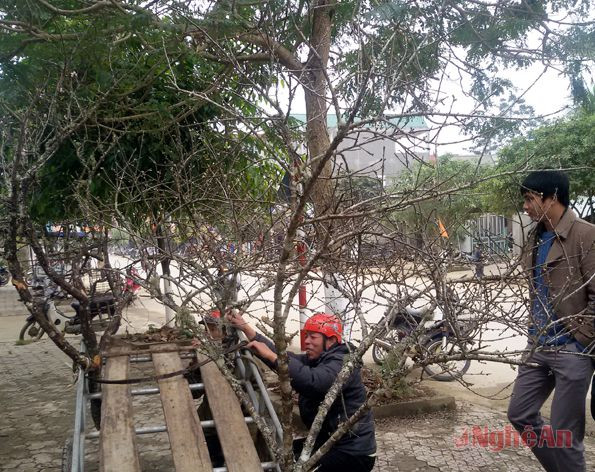Tri Le (Que Phong): Peach tree promotes effectiveness
(Baonghean) - Near Tet, trucks loaded with peach branches from Tri Le (Que Phong) are transported downstream. In that hustle and bustle, the Mong people here are really happy because the peach trees planted in the fields and in their gardens are blooming, at the same time bringing a good income to many households. There are peach branches that traders buy for millions of dong...
 |
| Dao Mong was taken to the market. |
In recent years, with the encouragement of the Party Committee, the government and the Border Guard, the Mong people in Tri Le have converted many types of crops with economic value, developed livestock... In particular, in recent years, stone peach, moldy peach or also known as Mong peach has been favored by many consumers. Before Tet, traders go to remote villages on the mountainside to buy. Seizing this opportunity, many Mong people quickly cut down wild peach branches to sell. But then, after cutting too much, the peach trees became more and more bare. Some households have boldly experimented with growing peach trees for sale.
Mr. Va Dung De, from Pa Khom village, is 30 years old this year, but has 5 years of experience growing peach trees on the fields to sell during Tet. He shared: “A few years ago, there were a lot of wild peach trees, and each year when I went to get them, I could sell them for 5 to 10 million. In recent years, I have brought them home to plant. These peach trees grow very quickly, and the whole tree can be sold, and if there are fruits, they are easy to sell and have value…” Due to the unique weather of the border area, the peach trees planted by the Mong people are not much different from natural peach trees. The branches are rough and dry. The old tree trunks are covered with a layer of moss, the buds are often numerous, and the flowers are a beautiful pink color. This is also the reason why peach hunters come to Tri Le to buy and bring them back to the lowlands to sell.
Mr. Tho Dua Tenh, Head of Pa Khom village, Tri Le commune added: “From 2009 until now, seeing many people from the lowlands come to get peach branches, the Mong people have realized that they are profitable in this business. Therefore, the people have encouraged each other to grow peach trees to sell the fruits and branches. Peach trees have flowers and fruits after 3 years of planting. Therefore, the Mong people not only grow peach trees in the fields, but also grow a lot in their home gardens. We grow a lot of peach trees with the hope of increasing income, eliminating hunger and reducing poverty.”
In the last days of the year, along the road from Tri Le commune to Que Phong district market, trucks loaded with peach trees are rumbling down. Unlike many years ago, this year, peach branches are grown from the fields, the flowers are more pink thanks to the care of the people. There are still many rough, moldy peach branches that are sold at high prices. Those are trees grown on the top of cloudy mountains. The higher the mountain, the more moldy the peach trees are. That is the outstanding feature of Tri Le peaches.
In order to contribute to the development of Mong peach trees, meet market demand, create jobs, increase income, eliminate hunger, reduce poverty, and improve the living standards of ethnic people in border areas, in 2013, the Que Phong Mountain Development Board and local authorities built a model of planting 6,000 peach trees in Pa Khom and Huoi Moi 2 villages.
Mr. Lo Xuan Thu, Chairman of Tri Le Commune People's Committee added: "In 2013, the organization organized for Mong ethnic villages to grow rice in 2 crops, however, the climate was too harsh, so the Party Committee and the government met to discuss and unify the organization of peach planting, making a model in Pa Khom and Huoi Moi 2 villages. After 2 years of implementation, peach trees are very effective, this model will certainly solve hunger and reduce poverty for Mong ethnic villages, because the weather is very suitable for peaches to grow, bloom beautifully and if harvested, there will be a lot of fruit. Recently, some peach branches planted by local people were bought by traders for 7 million VND; the lowest price is 500 thousand VND. Currently, the government and people are continuing to expand the peach planting model to increase income and stabilize life...".
The peach tree has been identified by the Party Committee and the government of Tri Le commune as the key tree to expand the area in 8 Mong villages. Accordingly, the commune is consulting Que Phong district to integrate policies to support people in growing peach trees in the direction of commodities... Accordingly, in the next few years, the Tri Le border area will be brilliant with peach blossoms in the spring.
Van Thanh






